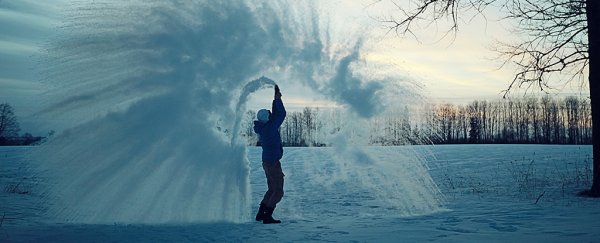If you want to freeze your water faster, heat it up first. This counter-intuitive piece of advice comes courtesy of the Mpemba effect, an odd phenomenon in physics that still has theorists scratching their heads.
If it exists at all – and not everybody is convinced – the observation still lacks a convincing explanation and ongoing evidence. But a new paper could be set to change that, explaining not only why the effect seems so elusive, but hinting at a possible flipside to the phenomenon that's just as weird.
In this latest study, a small team of Spanish researchers created a model that simplified the problem of simulating fluids by describing heated fluids as a collection of theoretical, inelastic granules.
Reducing complex fluid dynamics to a blocky representation provided them with an easier way to fine tune the system's starting conditions, showing how the jiggling and bouncing of simple particles translates into a rate of cooling and eventual freezing.
Observation of the Mpemba effect has a long history. Aristotle noted the Greeks of Pontus exploited the effect, while the English statesman Francis Bacon and famous French philosopher Rene Descartes also had something to say on the matter.
But it was Erasto Mpemba, an impatient schoolboy in 1960s Tanzania, who gave his name to the effected and sparked modern interest among researchers, when he noticed his warmer ice cream mixture froze quicker than those that had been cooled first.
His curiosity helped inspire a paper on the topic, sparking decades of heated debate that shows no sign of cooling.
Part of the issue is that the effect is so elusive. In spite of a history of notables writing about it, the effect doesn't always show itself.
It's also just so counterintuitive – why should the previous temperature history of a cooling material make any difference to its future temperature change?
This hasn't stopped people coming up with a range of suggestions.
Most speculation seems to revolve around the fact hotter particles move quicker than cooler ones, somehow affecting evaporation rates or ramping up convection currents that can quickly carry energy away.
Earlier this year, researchers proposed the properties of water's hydrogen bonds were to blame. By simulating clusters of water molecules, they revealed a connection between the initial temperature of the water and the ease at which molecules later formed ice crystals.
Colder water lacked this bond-breaking energy, meaning these molecules were off to a slower start when it came to reforming into a solid structure.
But this new study takes things a step further and suggests the Mpemba effect could be a feature of the temperature history of practically any fluid – not just water.
"Our work shows that the existence of the Mpemba effect is very sensitive to the initial preparation of the fluid or, in other words, to its previous history," researcher Andrés Santos from the University of Extremadura in Spain told Phys.org.
While the research doesn't list the exact influences that make or break the effect, it does show that if something affects the movements of particles prior to cooling, the rate of change in the fluid's temperature could be significantly affected.
"Our results show that the Mpemba effect is a generic non-equilibrium phenomenon that appears if the evolution of temperature depends on other physical quantities that characterise the initial state of the system," says Santos.
In other words, something like a spike in starting temperature can theoretically result in the kind of temperature loss that would see a fluid cool quicker, depending on the statistics of its temperature distribution.
The model doesn't rule out other explanations contributing to the effect, and if anything suggests multiple influences could potentially be at work.
It also suggests whatever the variables are, there's no guarantee they'd be practically simple to match, explaining why it's been so difficult to reproduce the effect.
Amazingly, the phenomenon could also push the other way – the same model shows colder fluids could heat up faster in an equally odd reverse-Mpemba effect.
Might it be possible for chilled water to reach boiling point faster than water at room-temperature under certain conditions?
The researchers claim they'll be investigating this kind of prediction as part of future studies.
They'd better be quick, though. The next Erasto Mpemba could already be warming up their ice cream in search of data.
This research was published in Physical Review Letters.
